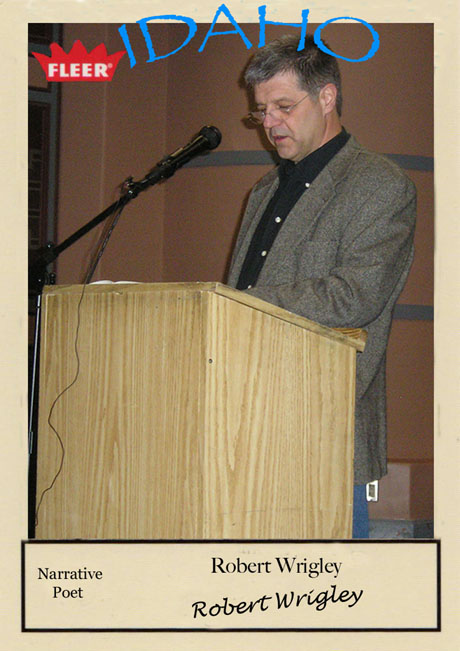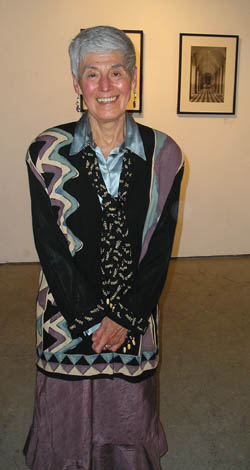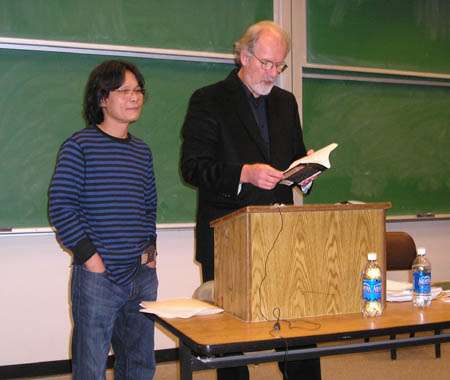
During contemporary poetry’s daily calisthenics of undermining deep meaning (even deconstructing signification entirely), devaluing image, eradicating continuity, erasing allusion, Ann Killough’s
Beloved Idea endeavors to provide the next exciting installment of empty device—that of metaphor. Her project in
Beloved Idea is to expose the stability of metaphor. In
Beloved Idea, Killough endeavors to short circuit any connection to a stable single metaphor in a poem by exploding the possibility of a single metaphor in her poems. The poems present a seemingly stable metaphor in their titles which then are deconstructed throughout the body of each poem, usually in very self-referential ways. The deconstruction usually occurs in two ways: (1) the initial metaphor in the title starts to take on so much metaphorical weight so as to render it useless as metaphor (i.e. it is used as a metaphor for this and that and the other thing to the point where its stability as locus of insight breaks down; an infinite metaphor) and (2) other items in the poem sneak up on the title metaphor and compete with it, draining it of its power the way Superman is drained by Kryptonite, attacking it as the central focus until it is nearly dead. So is
Beloved Idea really another venue to play the dead metaphor game?
Killough’s text works on another level as well, and this redeems its project masterfully. The central metaphor in the book (her beloved idea) is that of “the nation” (presumably our United States). Killough is set out to expose this metaphor as adeptly as she does the more solitary ones in her poem titles. In doing so, she is asking “what is a nation?” “what is
our nation?” In this way Killough’s book ceases to be just about textuality and breaks through to our actual experience of hanging this absurd little title of “nation” onto all of America’s disparate populations. She asks how could it possibly fit (which is a question I have kept asking myself since 2003 . . . along with who gets to define how that metaphor of the nation is used).
It is this questioning of authority that Killough also echoes in the last line of the first piece
“[The Wound]” in the book.
When the mob gathered and wrestled her to the ground she just kept yelling and pointing at visible articles of metaphor. the metaphor of the mob, for example, and of the ground, which was so repulsively comforting. She knew the metaphor of the wound was still safe in her poem, which was turning out to be a manger like all the others.
As though the poem had begun to cooperate with the authorities behind her back, which it undoubtedly had.The notion of comfort and safety in metaphor which the poem addresses, of course, is similar to the kinds of feelings that we expect authority to project in terms of, say, national security. The fact that her own creation, her own offspring is complicit with such authority behind her back must be discomfiting for Killough. She acknowledges this discomfort and seems resigned to it, the way, I imagine, we might resign ourselves as readers to the discomfort of not being able to hang anything heavy on the metaphor for fear that it should slide off.
In
”Body in Evidence” Killough employs the similes “like a lynched man” and “like a lost sheep” in such a way that provides an insight into her technique. In the first case, the hanging metaphor is compatible with the idea of a tenuous “fabric of ideological evidence.” In this case we are given a metaphor that works reasonably well. However, just when we expect other metaphors to behave, they don’t. The second simile is more like this. How does a lost sheep hang? The obviousness is dealt a severe blow. So, as readers our expectations that metaphor will work are built up by the first usage and then dashed by the second. Of course, one might point out that by allowing the first simile to behave properly she is setting us up as readers to stretch ourselves past the apparent incongruity. We tell ourselves, “Well, it must fit. The other one worked pretty well. Maybe if I just stretch and tax my imagination more.”
The
”White Whale” is an obvious reference to
Moby Dick a book so rife with metaphor, it serves as an irresistible target for Killough. Here we are reminded “one likely referent for the whale was the leviathan obsessions of the entire metaphorical body of her nation.” Here American desire seems to be implicated. Even more so in the next stanza/paragraph: “With its vast apparatus of conquest and its high-frequency cries of longing.” Moby Dick and the nation conflate, which points to the endless metaphorical chain she is building. It is endless like the “national desire.” and finally, the insanity of Ishmael is brought into the picture as it is mirrored by the collective insanity of the nation. Ishmael is alone in the water, tilting at windmills, so to speak the same way the U.S. has had to more or less go it alone in Iraq. The question remains whether we up to our collective arse in blood or oil.
By the end, “her nation” has its “relative sanity questioned to the point that there is some confusion about whether its relative sanity ever existed at all.”
Of course, what send-up of metaphor would be complete without a look at the grand master of them all, The Bible. In
”Holy Ghost” Killough explodes the notion of the “holy ghost” all over the screen. She seems to be duplicating the effect of television and how its duplication of image serves to concatenate metaphor, hyperlinking one image to the next through a few wonderful jump cuts. The holy ghost is the body politic. The holy ghost is a garment. The holy ghost comes upon the tongues of fire. The holy ghost as the actual process of consumption. Etc. This is reminiscent of seeing a car in five back-to-back commercials. What do all those cars mean? Why nothing, but such a comforting image sure does help in pushing the product. As Killough points out near the end, the holy ghost-become-body politic, become-garment, become-process-of-its-own-consumption becomes, finally, the site of its own annihilation. I wonder, though, if this means that I don’t have to pay attention to it anymore the way I don’t pay attention to commercials? Or, conversely, does it mean I have to pay strict attention to commercials to decipher how they may be manipulating me? Is it OK to feel manipulated? If one is manipulated without knowing, is this what is called pleasure? Or is that too old-fashioned?
I believe there may be a brand new form of pleasure packaged and ready to be delivered. This would certainly be in accordance with my experience up to this point in my life, though I might not be able to articulate how it has happened. If I accept it is my duty to attempt to articulate it, will my impulse to live solely within the frame of my own present experience be seen as negligence of duty? But what if this makes me happy?
Alas, I digress into a chain of babble which is fed by suspicion, a suspicion that I might not be happy, but that I could be happier if only I did or didn’t watch commercials.
There are other pieces in
Beloved Idea which relax the speculative eye turned against Killough’s nation. One of these is “[Underpants].”
[Underpants]
Underpants as necessarily referring to the manly underpants of startling size that regularly were hanging in a row on the porch across the alley from her bedroom.
As though a row of overweight fathers had flown through Brookline in their underpants and gotten caught in a clothesline.
The kind of fathers that run the world means of secret meetings on every continent flying over the seven seas in formation like Canada geese.
But that now had to fly with no underpants, their international penises hanging down like unusable landing gear.
•
She always rejoiced at the sight of the underpants.
They seemed to offer a kind of hope, although she wasn’t sure what.
Perhaps the kind of hope that is normally offered by undergarments hanging on a clothesline with their scanned faces broadcasting a story of organized and intimate renewal.
Of how somebody is thinking ahead.
•
Or perhaps the hope was more foundational, so to speak, and had to do with the sturdiness of the operation that produced the recurrent row of underpants.
Not just the dependably loud and Russian argumentation out of which the underpants appeared to be extruded like a row of continuing and faithful facts, but also the unvarying style and whiteness of the underpants.
As if they were a testament to some rigorous belief, perhaps in the absolute.
Perhaps just in the indisputable rightness of at least one thing.
•
Which brought her back to the migrating fathers in the original hypothesis and what it was exactly they had lost.
What it was exactly they had left innocently hanging across from her like a succession of mute and outmoded pronouns.
Like a succession of hopes of protection from the humiliation of nakedness, a succession of humiliatingly naked and public hopes.
Without which they flew shamelessly over the seven seas but would never again be able to land.In this poem Killough takes herself less seriously unless, of course, you are one of those people who takes underpants very seriously. Which I sometimes do. For example, I am of the opinion that boys wear underpants but those who sport “international penises” probably wear “underwear.” In fact, I would bet that any man over the age of 20 who referred to himself in a locker room as wearing “underpants” probably would be looked at as “not right.” This small detail aside (which, however, does cast some doubt on whether Killough has tread closely enough to that form of divine inspiration that is male idiocy she is criticizing) the fear of the Trilateral Commission is writ large in this poem. If only the kind of masculine junta that Killough refers to existed. Unfortunately, my perspective reveals no such thing. Mostly, I see male confusion exhibited during the game of “I’m wearing the pants.” But not only are none of them wearing the pants, so to speak. They aren’t wearing any underpants either. Which isn’t such a bad thing. I mean, really, why do any of us even wear underpants?
Finally, there is the Statue of Liberty, that most grandiose metaphor for the US that can be had.
From “Statue of Liberty” Killough assures us that The Statue of Liberty is essentially plastic. It has “begun to change something even in you, even in me.”
Beloved Idea is a concept book. It rides mostly on its ideas and the situations it imagines. It is never afraid to take on weight and then dump it in a heap by the side of the road Killough is traveling. It is an interesting trip through the minefield of metaphor. Each one you step on has the possibility of exploding.
However, if you are the kind of reader who reads to have a poet map on to your experience, she may not live up to your expectations. Similarly, if you expect a linguistic tour de force with as much music as there is concept for the mind to chew on, then you may find yourself still wanting more. The music here is not gutsy solos with a lot of flashy eighth notes and moments of syncopation but quirky minuets.
My main question is whether after we have emptied texts of all their devices whether we will want to read any of them anymore in their present condition or whether we will want to acknowledge them and embrace their shortcomings as we invite them back, one by one, into our texts, even, god forbid, into our narratives. Killough distrusts the glorious metaphor when she writes:
That if one feels compelled to pursue a glorious metaphor and defoliate the hell out of it one should probably go away and reexamine one’s linguistic priorities.
While her unkempt garden speaks to my desire to let the oleander overtake the highway median, I can’t help myself too often in awe of the last few riverine oaks poking up out of the floor of the Valley into this Valley air. If someday I might get lost in the upper branches of its canopy, please help to remind me to come back down to the ground. Meanwhile, onwards with the birds . . . may someday they land somewhere.



